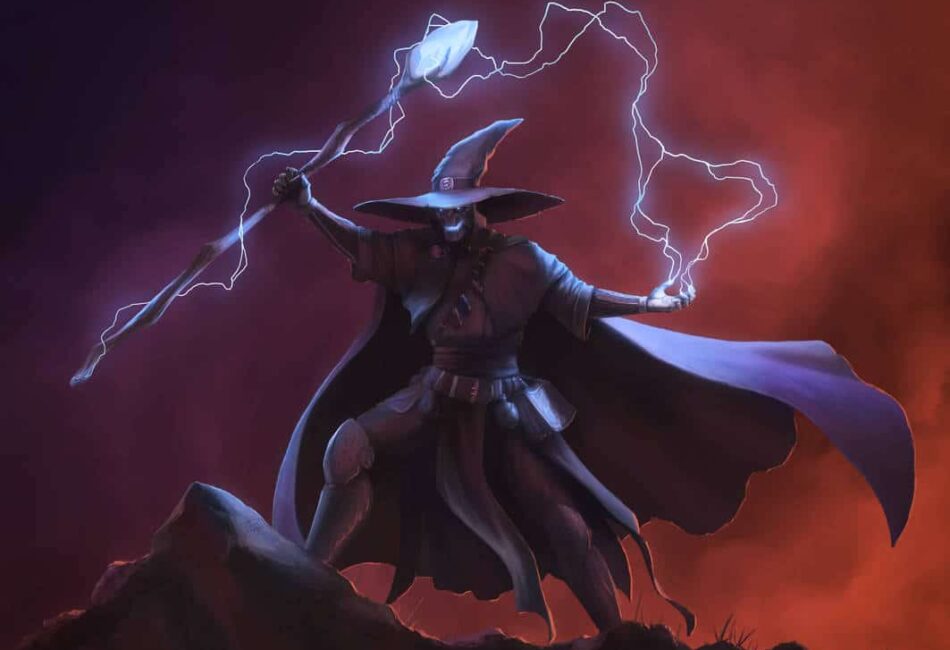Wizards are the ultimate spellcasting class in D&D 5th edition. With access to about 300 DnD spells, wizards are able to do almost anything from scout to negotiate to blow everyone up. With versatility comes complexity and wizards can be very complex to play as and manage resources. Your abilities largely revolve around your spellcasting.
Wizards start the game with no armor proficiency and the lowest hit die: a d6. While you can compensate in many magical ways, wizards are known to be powerful yet fragile characters. As such, you’ll want to spend a lot of time at the back of the party, letting your allies charge into battle as you cast spells from a distance.
You gain proficiency in Intelligence and Wisdom saving throws, making you mentally resistant to some disabling effects from enemies. You also gain two intelligence- or wisdom-based skills.
You start the game with a weapon you’ll never want to use, a component pouch or arcane focus to cover the cost of your spells’ material components, a pack, and a spellbook. Your spellbook is the catalog of all of the spells you have studied over the years. Don’t lose it.
Welcome to a Wizard 5e guide.
Spellcasting (1st level)

The Wizard class entirely revolves around your ability to cast spells. While other classes have core functions to supplement this, wizards do not and any supplementary features are added either via your subclass, feats you take, or magic items you find. Spellcasting is a complicated mechanic in D&D, but here’s how it works for a wizard.
To understand spellcasting, you need to understand three aspects and how they relate to each other: the spells in your spellbook, your prepared spells, and your spell slots. Each of these is different from the other and each contributes to your prowess as a spellcaster.
The Spells in Your Spellbook
As a wizard, you have all of your spells written down in a spellbook, which you carry around with you on your adventures. These writings are abstract and arcane formulas that probably look like the scratchings of a madman to anyone else.
At 1st level, you start with six 1st level spells in your book and each time you level up, you get two more spells in your book. This forms the basis of your spellbook. However, as you adventure, you can add more spells to your book. The only upper limit to the number of spells you can have in your book is the number of wizard spells in the game.
You add more spells by finding (or buying) wizard spell scrolls. These are scrolls with written instructions about how to cast a particular spell. You can copy it across into your spellbook, which requires time and effort as you decipher the scribblings of another wizard, understand the nature of the spell, and rewrite it your own way in your book. It takes 2 hours and costs 50gp for each level of the spell you’re copying. For example, a 5th level spell takes 10 hours to copy across and costs 250gp.
Because this is a complicated process, you can only copy spells if they are at a level at which you can prepare spells. For example, a 1st level wizard can only prepare 1st level wizard spells. If they find a spell scroll of 2nd level or higher, they need to wait until they level up enough to cast 2nd level spells before they copy it into their book.
If any of your spells have the “ritual” tag on them, you are able to cast them as a ritual. It takes ten minutes longer to cast a spell this way but it doesn’t expend a spell slot nor do you need to have the spell prepared. Speaking of which…
Preparing Spells

Each day, you prepare a certain number of spells from your spellbook. Preparing spells is akin to memorizing everything required to cast it: the incantations, the swish and flick, and whatever components are needed.
The number you can prepare is equal to your wizard level + your Intelligence modifier. Level up and become a more experienced wizard? You can prepare more spells each day. Boost your Intelligence and become smarter? You can prepare more spells each day. Your goal should be to become the biggest nerd you can be and reach a maximum Intelligence score as quickly as possible to maximize your spellcasting.
During your adventures, you can only cast a spell that you have memorized. The others that are in your spellbook are off the menu for today. The only way to cast the unprepared spells in your spellbook is as a ritual (if the spell allows) or if you wait until tomorrow to prepare it.
Do you know where your adventure’s headed? Prepare spells that you predict will come in handy. Expecting a run-in with undead creatures? Prepare Protection from Good and Evil. Scaling a mountain? Prepare Feather Fall. Scouting ahead to know what’s coming can be incredibly useful because you’re always one day away from that spell you need.
Spell Slots
Lastly, spell slots are the fuel source of your spells. You’ve got them written in your spellbook, you’ve memorized some of them. When you go to cast that spell, spell slots are what you need. The number of spell slots you have increased as you level up in this class. The full table can be found on page 113 of the PHB.
When you go to cast a spell, you power it with a spell slot. This fuel source within you is expended and converted into some magical effect in the world. The slot is then used up and you need to rest in order to regain that fuel.
In order to cast a spell, you need a large enough power source. If you’re casting a 2nd level spell, it needs to be fueled by a 2nd level spell slot. A 1st level spell slot is not enough arcane juice for what you are trying to do. You can, however, use a 3rd level spell slot. In this case, you have too much juice. The spell will be cast and sometimes be more potent than usual. Each spell describes if it benefits from being cast at a higher level.
Once you finish a long rest, also known as a good night’s rest, you regain all your expended spell slots.
Putting It All Together
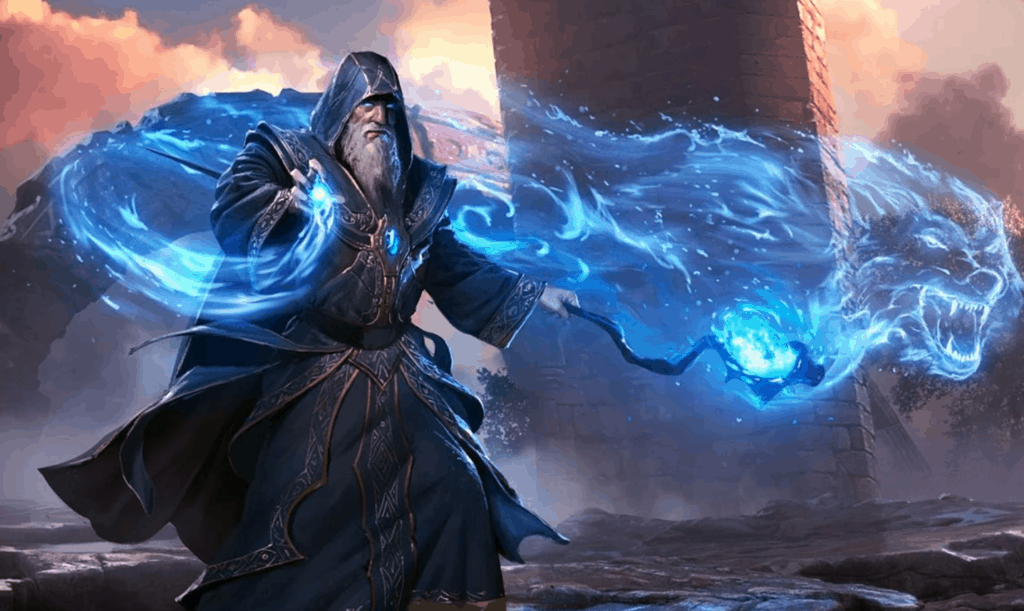
Because these three aspects of spellcasting are different, there are some key features of spellcasting to highlight.
- When you cast a spell, you expend a spell slot, not a prepared spell. If you have three spell slots, you can cast the same prepared spell over and over again.
- Cantrips are considered 0th level spells. You have a set number of cantrips forever memorized and you never need a spell slot to cast them.
- Wizards need money. If you want to collect more spells (and you do) to have in your spellbook, you’re going to need gold. Tell your party members this since they have a vested interest in you becoming a better spellcaster as well.
- Don’t lose your spellbook! Or make a copy somewhere that won’t burn down. Make your body your spellbook and make each tattoo a spell. If you reach a high enough level, your DM will come after that book to teach you the value of backing up your data.
Arcane Recovery (1st level)
Don’t want to wait until the next day to regain spell slots? You can actually gain a few back after a short rest. This only works once a day but you regain half your wizard level rounded up. Regaining a spell slot when you only have three, to begin with, is pretty great.
Ability Score Improvements
Like every class, wizards get ability score improvements at the 4th level. While feats are interesting options, your spellcasting revolves around Intelligence. Get that to 20 before taking a feat. Then grab something fun like Telekinetic, you’ve earned it.
Spell Mastery (18th level)
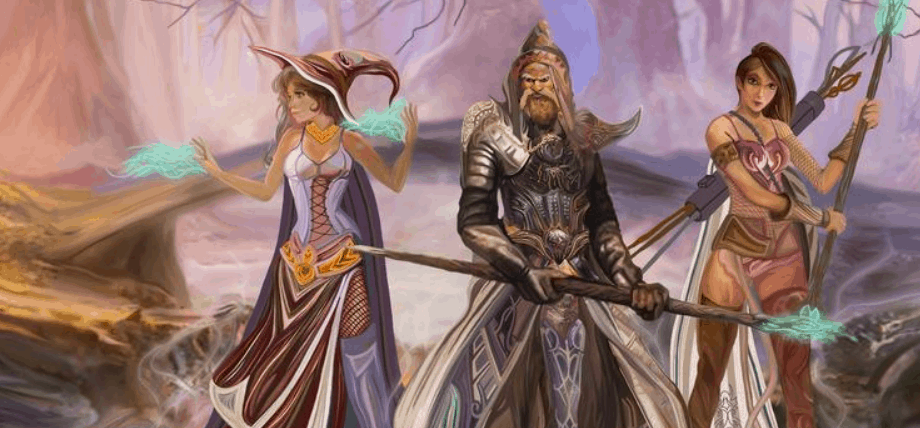
Phew… you’ve come a long way to get to 18th level and golly it is worth it. You master one 1st level spell and one 2nd level spell. You can cast these spells without expanding spell slots. This feature doesn’t work only once or twice per day, it always works. Great options include Shield, Absorb Elements, Misty Step, Invisibility, or See Invisibility.
Signature Spell (20th level)
Your mastery continues and you can now cast two 3rd level spells once a day without expending a spell slot. You also don’t have to have these spells prepared, effectively giving you two more prepared spells.
Optional Abilities (TCoE)
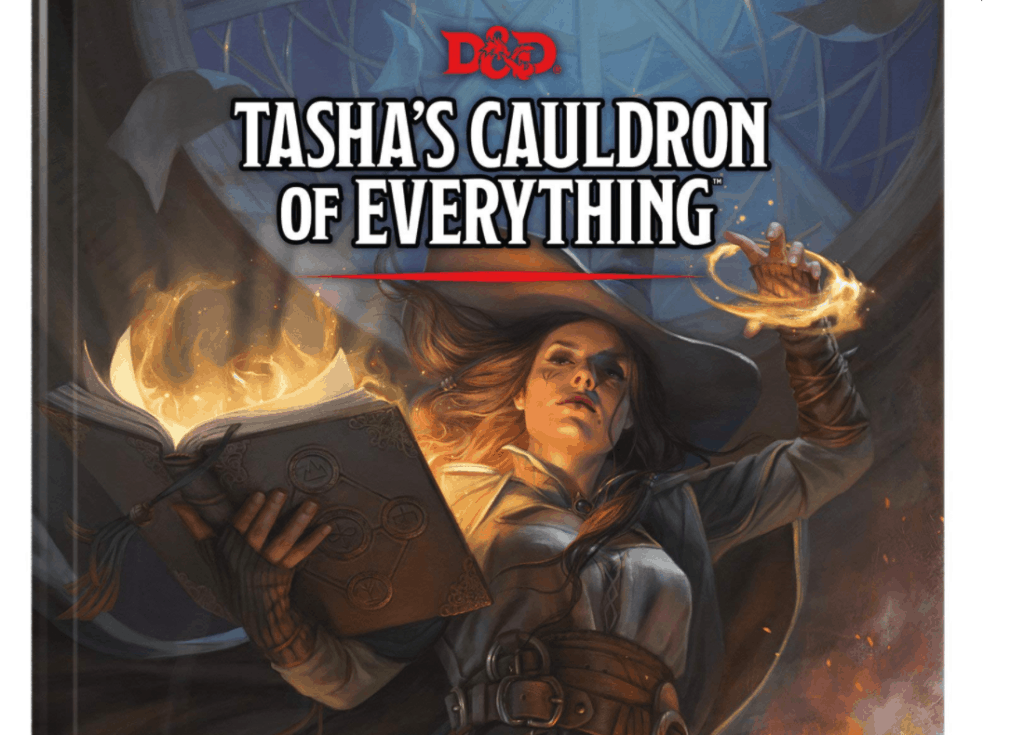
Tasha’s Cauldron of Everything published optional class features for every class. Since these features are optional, you’ll need to check with your DM if you can use them.
Additional Wizard Spells
Added to the list are some updated spells from other sourcebooks as well as new spells included in TCoE. You get access to the new summoning spells and interesting new Psionic options. Bladesingers will be happy to see Booming Blade on the list.
See also: Bladesinger 5e Guide.
Cantrip Formulas
The wizard’s version of cantrip versatility. Now you don’t have to commit to cantrips forever. Instead, you can retrain yourself to swap out one cantrip every long rest. This is even more versatile than what other classes get as they are limited solely to when they level up. You can change a cantrip every day!
Subclasses
There are thirteen wizard subclasses also called Arcane Traditions and they begin at 2nd level for every wizard, making them more core to their class and a more attractive option for multiclassing.
The majority of them are based on one particular school of magic. However, any wizard can cast any wizard spell. Instead, expect your subclass abilities to enhance the spells of your school and complement their style.
School of Abjuration
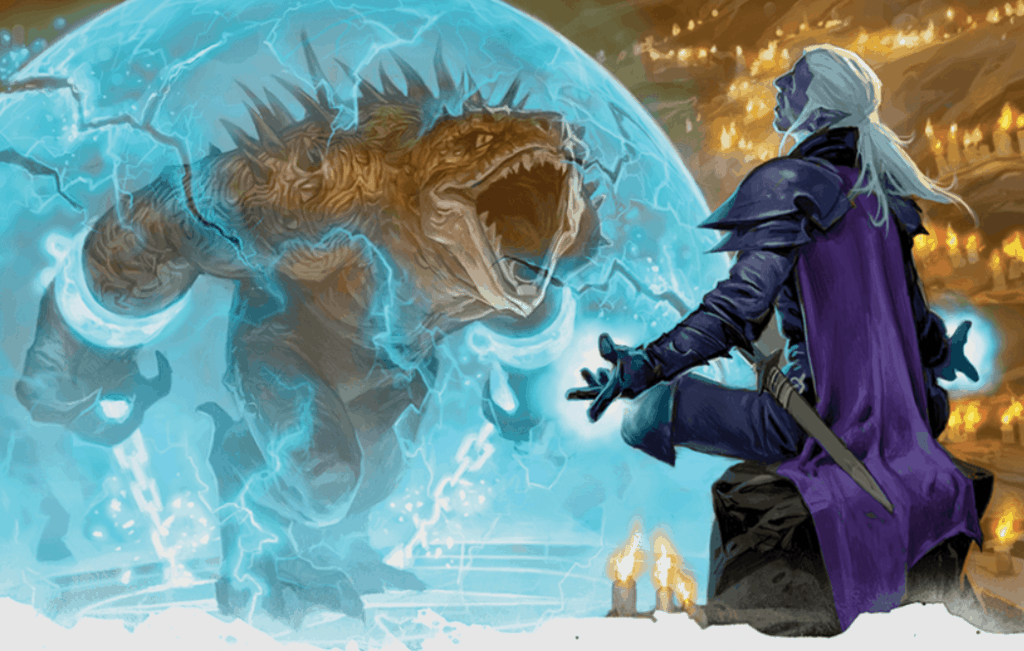
The school of abjuration is concerned with defensive magic. This includes magical shields, wards, and banishing abilities. At the 2nd level, copying abjuration spells cost you half the normal price and time. You can also create a magical ward around yourself, acting like temporary hit points. Note that these are not temporary hit points so you can benefit from both simultaneously.
At the 6th level, you can extend your ward with others within 30 feet of you. At the 10th level, you can add your proficiency to the ability checks of Counterspell and Dispel Magic. If you are encountering enemy spellcasters, you can significantly cripple their magic as you can successfully counter even their most powerful spells half the time.
Lastly, you gain an advantage on saving throws against spells and resistance to spell damage, making you a durable challenge in the face of any hostile mage. Unfortunately, if your DM likes to only throw things that bite and claw, you’ll be missing out.
School of Conjuration
The school of conjuration is concerned with magically creating something out of nothing. This includes objects, creatures, environmental effects, and much more. At the 2nd level, copying conjuration spells cost you half the normal price and time. You can also magically conjure an item object no larger than 3 feet on each side.
At the 6th level, you learn to conjure a creature to another space. You learn to teleport yourself 30 feet, or magically swap places with a willing creature. Did a terrifying threat run up behind your party and attack you? Swap places with the barbarian and lets them sort it out. At the 10th level, your concentration can’t be broken on conjuration spells from taking damage. This is the most common way of losing concentration since the other one is falling unconscious. This ability is even better when using the summoning spells from TCoE, which require concentration throughout the entire hour.
Lastly, at the 14th level, creatures you summon gain 30 temporary hit points, significantly increasing their durability. At this point, you’ve become used to relying on summoned creatures in battle. Spells like Conjure Minor Elementals that summon multiple creatures can create a huge pool of hit points in front of you.
School of Divination
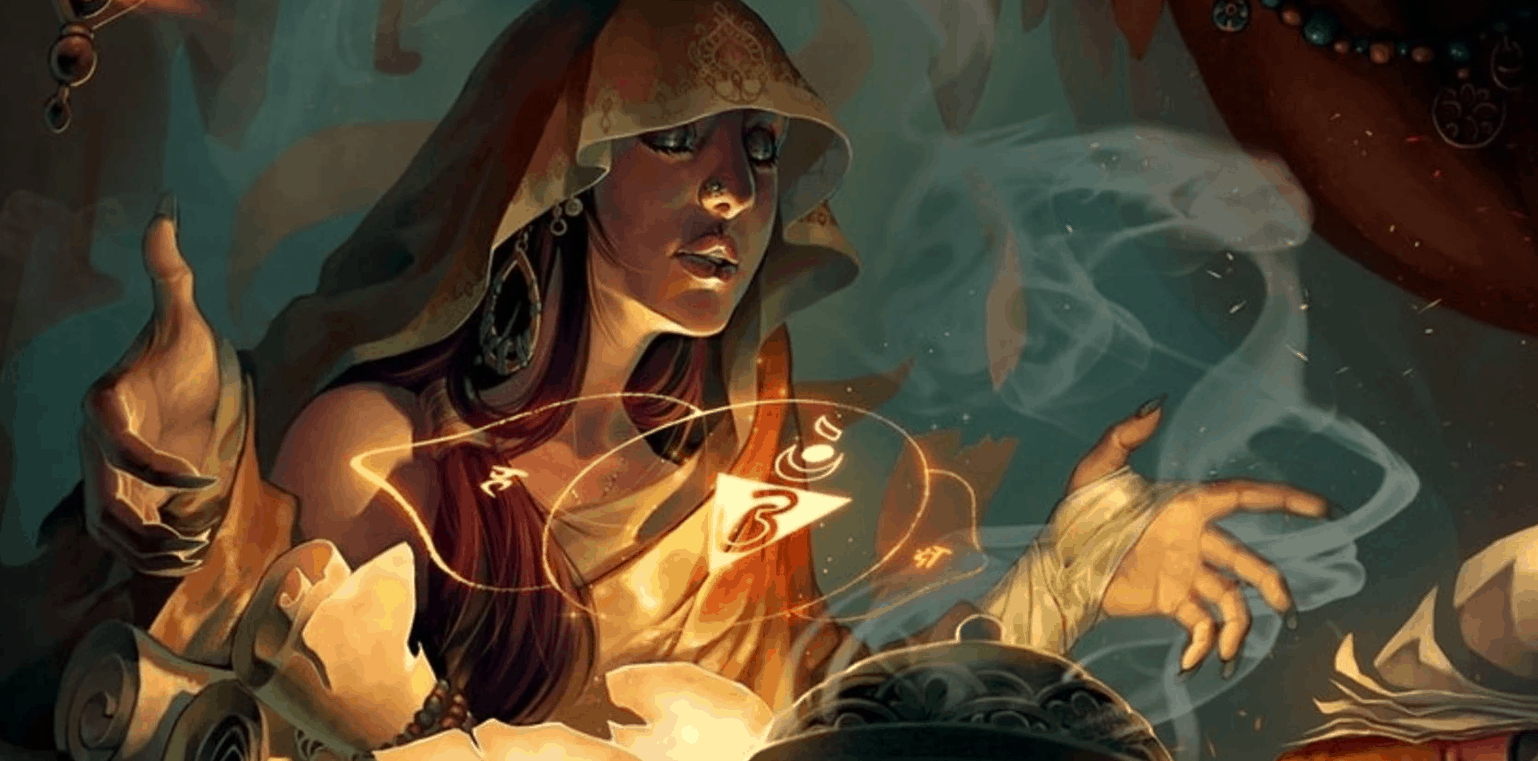
The school of divination is concerned with the barriers of space and time, trying to look ahead to the future, or uncover hidden knowledge in other places. At the 2nd level, copying a divination spell costs half the price and time.
You also get the incredibly powerful Portent rolls. At the start of each day, you roll two d20s and save the result. Then, at any point during that day, you can overrule any dice roll before it’s been made and replace it with your predetermined roll. Make an enemy roll low on their attack or saving throw, make an ally roll high. Just be sure not to waste it on tedious rolls.
At 6th level, you regain a spell slot when you cast a divination spell of 2nd level or higher. At the 10th level, you can give yourself darkvision, ethereal sight, greater comprehension, or the ability to see invisible creatures. Most races start with darkvision and Comprehend Languages can be cast as a ritual so your best options are the other two.
Lastly, at the 14th level, you gain a third Portent for the day. Portents are powerful enough that you won’t feel underwhelmed by having one more every day.
School of Enchantment
The school of enchantment is concerned with beguiling the senses and entrancing enemies. Make someone afraid of you, in love with you, or do what you say. At the 2nd level, copying an enchantment spell costs half the price and time. You can also hypnotize a creature within 5 feet of you and maintain it indefinitely. While you don’t want to be this close to any enemies as a wizard, it’s a decent pause button until the rest of your party can get to you.
At the 6th level, you can redirect a ranged attack against you to another target within range. The attack instead targets the creature close to you, which is most likely an ally of yours. But that’s an ally of yours with a higher AC and more HP. At 10th level, your enchantment spells can target two people when they normally target one. Paralyze multiple enemies using Hold Person or eventually outright murder a couple with Power Word Kill.
Lastly, at 14th level, you gain the power to gaslight a creature you’ve charmed and make them forget that you ever charmed them. Unfortunately, you might never find yourself in a situation where this is needed.
School of Evocation
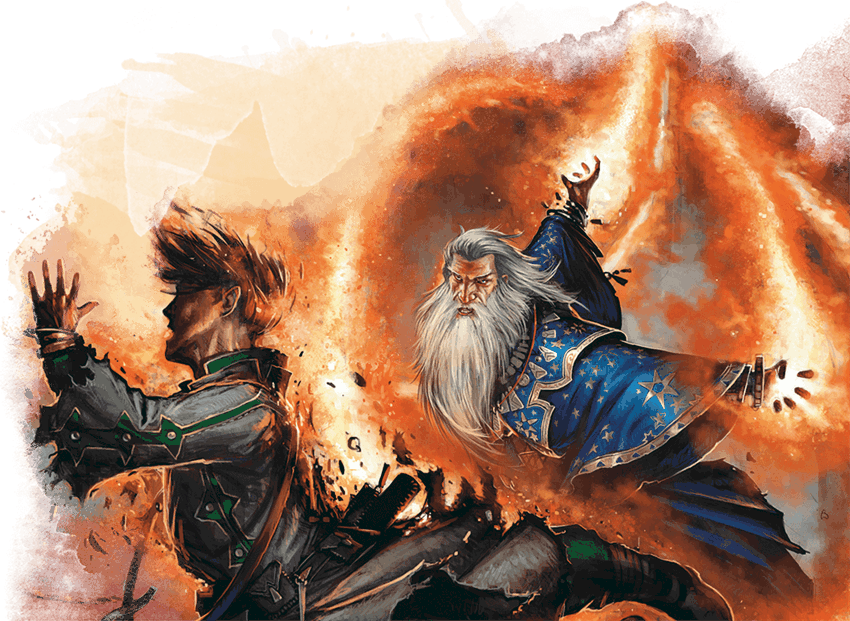
The school of evocation is concerned with explosions. What kind? Every kind. Evokers focus their magical ability to create energy that manifests in forms from fireballs to lightning storms. At the 2nd level, copying an evocation spell costs half the price and time. You also gain the ability to save your allies from your own magic.
When you drop a fireball on an area that catches enemies and allies alike, you can firebrand your way through it to make your allies automatically succeed on the saving throw and take no damage. This is what the Sorcerer’s Careful Spell wishes it could be.
At the 6th level, creatures who succeed on their saving throw against your cantrips still take half damage. At the 10th level, you can add your Intelligence modifier to a damage roll of an evocation spell. This effectively gives you an extra 5 damage every round.
Lastly, at the 14th level, you can deal maximum damage with a damaging wizard spell. Deal 53 fire damage to every enemy in a 20-foot radius using Fireball spell and save your allies from this effect using your 2nd level feature. If you use this feature again on the same day, it begins to take a toll on you and you start taking damage. Even still, sometimes it’s easier for the cleric to focus on just healing you as you go supernova on the battlefield.
School of Illusion
The school of illusion is concerned with magical effects that trick the mind and disguise the truth. Illusion magic can be tricky to use at the game table. It heavily depends on your DM’s ability to play along and be open to illusory solutions to problems. At the 2nd level, copying an illusion spell costs half the price and time. You also gain access to Minor Illusion if you didn’t already have it. Otherwise, you gain another cantrip. Moreover, when you cast Minor Illusion, you can create both a visual and auditory effect simultaneously.
At the 6th level, you can change the nature of your illusions on the fly. This allows you to cast the same illusion spell multiple times using the same duration. Plan ahead and string together multiple illusions with one spell slot. At 10th level, you can throw an illusion of yourself in front of an incoming attack, causing it to automatically miss. The fact that this has no saving throw and just misses makes this highly beneficial for someone with not many hit points to spare.
Lastly, at the 14th level, your illusions become so powerful that they become real. Create a cover for your party, a bridge to cross a chasm, or payment for a magic item and run away before it disappears.
School of Necromancy
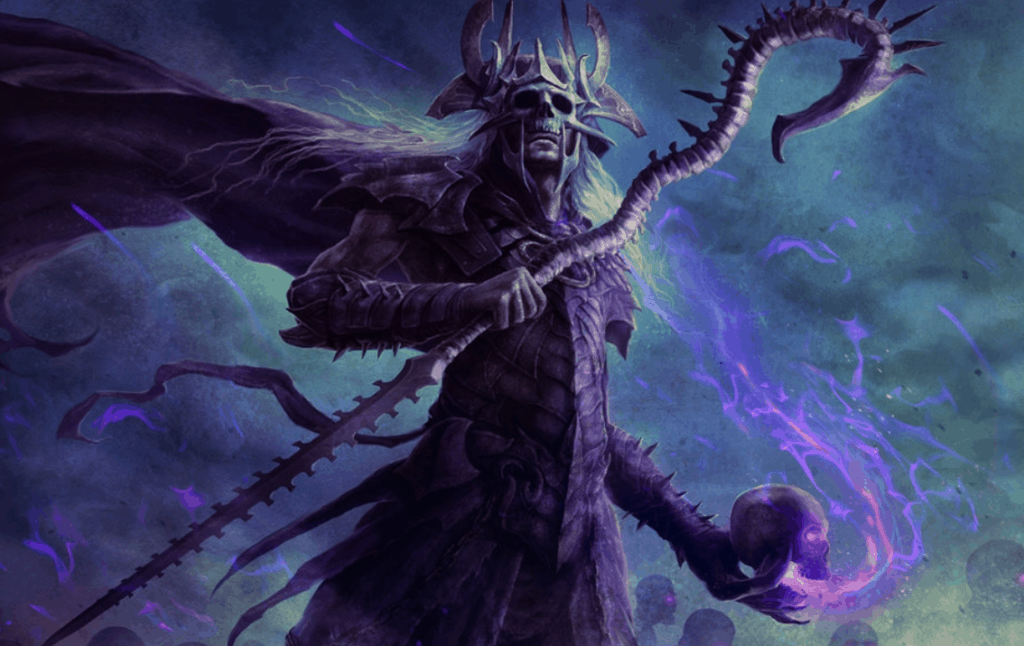
The school of necromancy is concerned with the powers of life and death. At the 2nd level, copying a necromancy spell costs half the price and time. You can also regain hit points by killing creatures with your spells of 1st level or higher. Since this doesn’t specify that it has to be a hostile creature, you could easily find animals or bugs to kill to heal yourself as well.
At the 6th level, you learn Animate Dead if you don’t already know it and can target an additional pile of bones to create another undead. Keep in mind that if you want to maintain control of these undead creatures after a day, you need to cast this spell again each day. At the 10th level, you gain resistance to necrotic damage and your hit point maximum can’t be reduced. A damage resistance, even an uncommon one, is always welcome.
Lastly, at the 14th level, you can assert control over undead creatures that you didn’t create. Although this doesn’t work as well for intelligent undead, being able to take control of an enemy takes a turn away from the enemy team and adds one to yours, potentially turning the tide.
School of Transmutation
The school of transmutation is concerned with the magic of changing the form of objects and creatures. At the 2nd level, copying a transmutation spell costs half the price and time. You can also change an object composed entirely of one material into another. You are limited mostly by time as it takes you 10 minutes to transform 1 cubic foot of material. You could transform a cheaper material into a more expensive one or you could transform a locked iron door into a wooden one before having someone break it with an axe.
At the 6th level, you can create a transmuter’s stone. The bearer of the stone gains darkvision, an extra 10 feet of speed, proficiency in Constitution saving throws, or resistance to a type of elemental damage. Unless you’re expecting to fight a particular kind of dragon, give yourself the Constitution saving throw proficiency and change it to one of the other options when necessary.
At the 10th level, you can cast Polymorph on yourself without expending a spell slot. However, you can only turn yourself into a CR 1 creature or lower. Common uses of this spell include disabling enemies and turning yourself into a tyrannosaurus rex. Unfortunately, this is only useful for scouting.
Lastly, at the 14th level, you can unleash your transmuter’s stone in order to create one of the following effects: transmute a non-magical object into another object, remove all diseases and poisons in someone, bring someone back to life, or make someone look younger. The best use of this ability is to be able to bring someone back to life since wizards don’t typically have access to healing spells.
War Magic (XGtE)
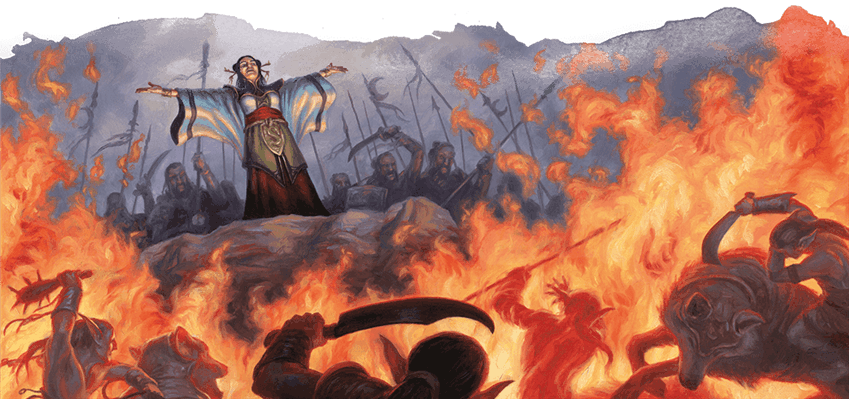
Wizards of the war magic tradition have learned to harness their magic, particularly in combat. This subclass harnesses the defensive power of abjuration and the offensive power of evocation, similar to the Eldritch Knight. At the 2nd level, you can use your reaction to create an Arcane Deflection to gain a +2 bonus to your AC when attacked or a +4 to a saving throw you failed. After you use this, you can only cast cantrips for a turn. You can also add your Intelligence modifier to initiative rolls.
At the 6th level, you can steal magical power from enemy spellcasters when you use Counterspell and Dispel Magic. You store this energy and can deal extra force damage using it. Unfortunately, if you manage to successfully get to that point, you only deal an extra three damage.
At 10th level, you are stronger when concentrating on a spell and gain a +2 bonus to AC and saving throws. You’re most likely going to spend most of the combat concentrating on a spell, and this helps you maintain your concentration and keep these benefits.
Lastly, at the 14th level, you can deal force damage to three enemies when you create your Arcane Deflection. The damage is nice but your reaction might be better used for Counterspell and your action might be more effectively used casting a leveled spell rather than a cantrip.
Chronurgy (EGtW)
Wizards of the Chronurgy tradition learn to bend the forces of time to their will. This is one of two subclasses that harness the über-magic known as dunamancy from the Wildemount setting. Messing with time creates some very useful and powerful abilities.
At the 2nd level, you can force a creature to reroll a d20 roll even after knowing whether or not it succeeded. This ability functions similarly to the divination wizard’s portent roll. However, you don’t have the foresight of what the new role will be. In addition, you can add your Intelligence modifier to initiative rolls.
At the 6th level, you can incapacitate a creature for a turn. Many monsters typically have high Constitution saving throws but this can be useful against an enemy when you or an ally need to run away and you don’t want to Disengage.
At 10th level, you can hold a spell in stasis and unleash it later. This is similar to the Reserve Ioun Stone or Ring of Spell Storing and can be used to have an ally throw an additional spell into combat or immediately throw down a spell with a long casting time. Make your DM figure out if you can use this to throw a Galder’s Tower at someone.
Lastly, at the 14th level, you gain the ability to decide the future. When someone within 60 feet of you makes a d20 roll, you can decide whether or not it succeeds. You gain one level of exhaustion when you use this feature. Six uses in a day, and you’ll kill yourself, so save this for those roles that really mean life or death. If your DM uses Matt Mercer’s Resurrection checks, you can determine that it just works.
Graviturgy (EGtW)
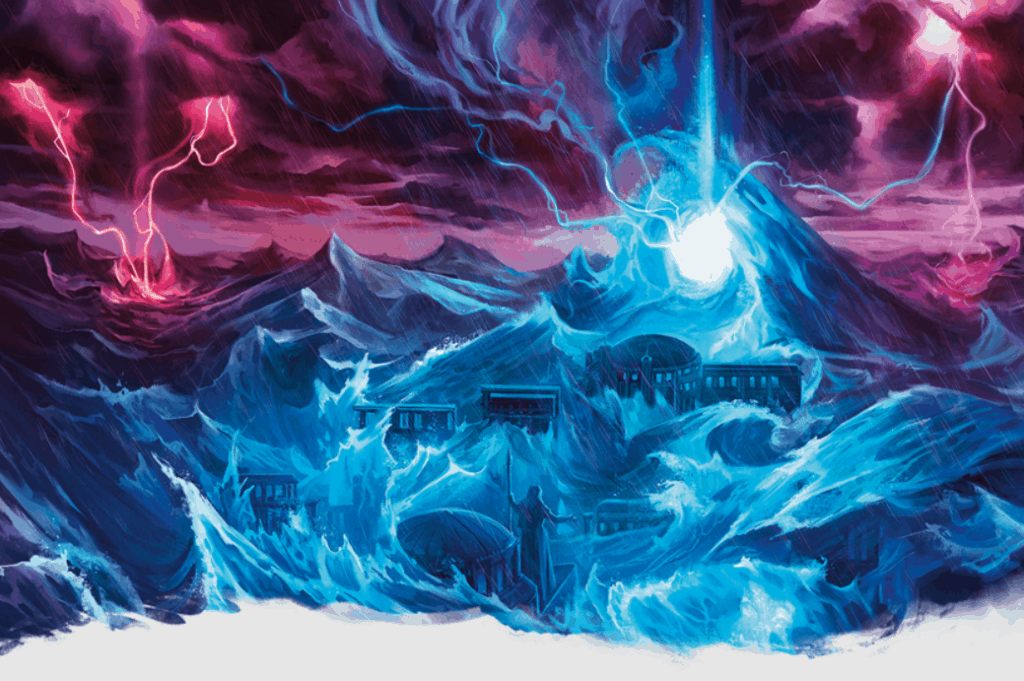
The second dunamancy subclass, this tradition commands the power of gravitational forces. At the 2nd level, you can adjust the density of a creature conversely affecting their speed and strength. Extra speed is nice and the advantage on Strength checks is useful for grapplers but you’ll probably find better uses for your action.
At the 6th level, you can move the target of a spell 5 feet. This is somewhat situational but adds some utility to your spellcasting as you can get yourself or an ally out of range of an enemy. Since they’re not using their movement, they won’t take an opportunity to attack.
At the 10th level, can cause a weapon attack to deal extra damage as you increase the force behind it. Otherwise, you can increase the fall damage of an enemy. The second option is uncommon and you’ll be deciding whether to keep your reaction for better abilities.
Lastly, at the 14th level, you become the center of a sinkhole, and hostile creatures within 30 feet of you either cannot move or move with extreme difficulty. While you don’t want to be near many creatures in general, a 30-foot radius makes it hard for anyone to get near you.
Bladesinging (TCoE)
This subclass was originally published in the Sword Coast Adventurer’s Guide and was republished in Tasha’s Cauldron of Everything with a few minor changes. Bladesinging turns the wizard from a squishy, low-AC spellcaster into a melee wizard who’s great at dancing.
At the 2nd level, you gain proficiency with light armor and one one-handed melee weapon. You’ll want to pick a weapon with the finesse property since you’ll already want a good Dexterity score for your AC and the rapier has the best damage output with this property.
You also learn the blade song, an ancient magical dance that gives you the following benefits for one minute: you can add your Intelligence modifier to your AC and concentration checks, an additional 10 feet of speed, and an advantage on Dexterity (Acrobatics) checks.
At the 6th level, you can attack twice and can cast a cantrip as one of those attacks. Sounds like a job for Booming Blade. At the 10th level, you can reduce the damage done to you by expending a spell slot. You should already have access to spells to mitigate damage like Shield and Absorb Elements.
Lastly, at the 14th level, you can add your Intelligence modifier to your melee weapon attacks. With a high Intelligence and Dexterity, you could be adding ten damage to every attack. With all of these abilities and a full suite of spells to complement, the Bladesinger can be as effective in melee as a fighter.
Order of Scribes (TCoE)
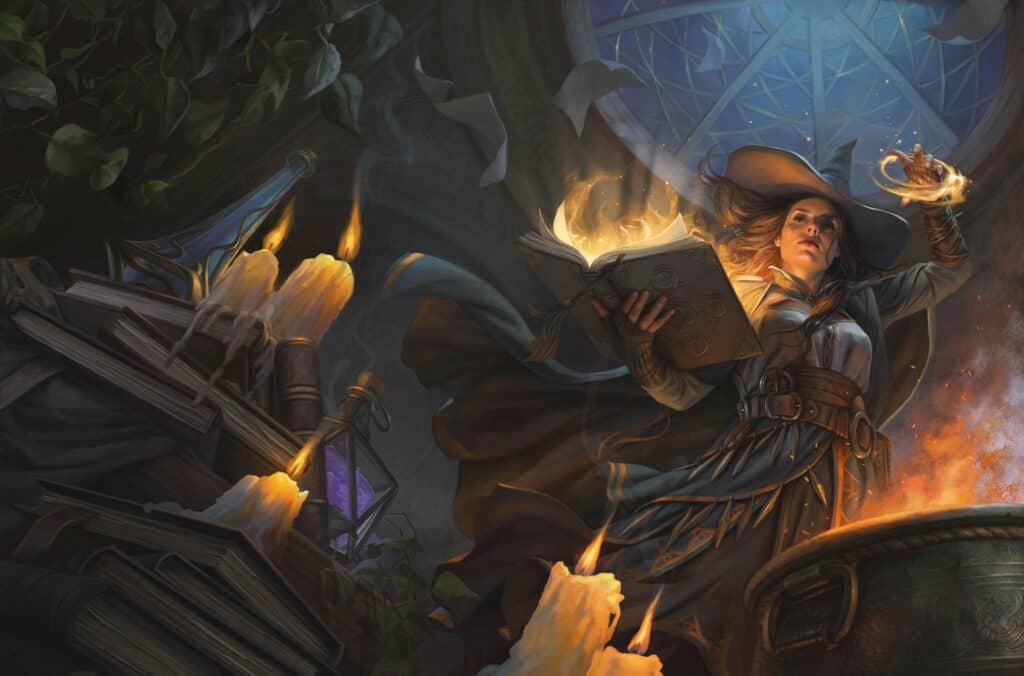
On the other end of the spectrum, this subclass dives deep into the scholarly nature of the wizard and revolves around your pursuit of collecting all of the spells in the game. At the 2nd level, you have access to two magical things: a quill and a spellbook, cementing your place as the bookish wizard.
The quill allows you to reduce the time taken to copy a spell from two hours per level to two minutes. The spellbook acts as your focus and allows you to change the damage types of spells you cast with the damage of another spell in your book.
You’ll need to consider which spells you pick at each level but this implements the sorcerer’s Transmuted Spell option for free every time you cast a spell. Moreover, casting ritual spells doesn’t take 10 minutes longer. Cast Detect Magic without ever expending a spell slot.
At the 6th level, the sentience within your spellbook manifests into a form that you can communicate with. Use it to scout up to 300 feet of you, cast a spell from its space while you hide behind a wall, and so that you have a friend to chat with wherever you go.
At the 10th level, you become an expert at creating spell scrolls and can transcribe one of your 1st or 2nd level spells onto a scroll and it becomes one level more powerful. It only lasts for the day and only you can read it, so you can’t store up scrolls over time for your party to go supernova with.
Lastly, at the 14th level, your spellbook gives you an advantage on Intelligence (Arcana) checks. Arcana checks are used to copy spell scrolls you come across into your spellbook.
Moreover, you can sacrifice your spellbook’s mind to prevent an instance of damage. However, spells disappear from your spellbook as a result. It does not specify whether you choose which spells to delete or the DM determines it, so you could lose your best spells using this ability. You should definitely have a backup spellbook anyway but you won’t be able to cast the deleted spells for a few days.
Race Options
If you’re not using the Customized Origin feature from TCoE, prioritize races with an Intelligence increase. Unfortunately, there are few races with a +2 bonus to this stat.
Races with a +2 bonus to Intelligence:
- Gnome. Advantage on mental saving throws against magic and a free cantrip if you choose Forest Gnome
- Vedalken. Advantage on all mental saving throws, additional proficiencies, and partial amphibiousness.
Races with a +1 to Intelligence:
- Half-Elf. Two free skills.
- High Elf. An additional cantrip.
- Human. The variant gives you access to a feat at 1st level.
- Tiefling. An additional cantrip and two spells. Choose the Mammon subrace for some better spells.
- Hobgoblin. Proficiency with light armor and a bonus to one attack based on the number of allies who see you miss.
- Yuan-Ti Pureblood. Poison immunity, magic resistance, a cantrip (albeit useless), and two spells. However, your spellcasting ability Suggestion is Charisma, disabling its potency.
- Changeling. Unlimited shape-changing.
- Warforged. Additional proficiencies, +1 to AC, and poison resistance.
- Gith. Mage Hand and two additional spells.
- Simic Hybrid. Manta Glide replaces Feather Fall and you gain +1 to AC.
If you are using Customized Origin, many of the same options you find above will be great for fighters since many of them are made with martial characters in mind. However, it’s hard to forgo Custom Lineage for a +2 to Intelligence and a free feat at the 1st level.
Other great options include Mountain Dwarf for two +2 increases and proficiency with medium armor, Loxodon or Tortles with high natural AC, and Goblins to Disengage or Hide as a bonus action.
FAQ
Question: At what level do wizards get 3rd level spells?
Answer: 5th level. Spell levels are not the same as class levels and the wizard table on page 113 of the PHB describes what level spells wizards can cast.
Question: What wizard spells should I take?
Answer: The wizard spell list is extensive and there’s no perfect choice. Pick a good damaging cantrip like Fire Bolt, utility options like Prestidigitation and Mage Hand. Great 1st level spells include Absorb Elements and Shield to mitigate damage, Magic Missile for automatic damage, Feather Fall so you don’t fall to your death, Find Familiar to scout and gain advantage on attacks, and Alarm so your party doesn’t get ambushed when resting.
Question: How do wizards get new spells 5e?
Answer: Wizards gain two additional spells every time they level up. In addition, you can find or buy spell scrolls on your adventures and copy them into your spellbook to gain more spells.
Question: Are wizards good 5e?
Answer: Wizards are one of the most powerful, iconic spellcasters in D&D. They gain access to at least 44 spells and at most roughly 300. Compared to the sorcerer’s 15 spells known at 20th level, wizards have an incredible amount of versatility.
Question: Do wizards know all spells?
Answer: A wizard that finds every wizard spell while on their adventurers can have them all in their spellbook at the same time. The number of spells that they can prepare is limited by their Intelligence and wizard level.
Question: Can wizards change cantrips?
Answer: Using the optional rules from TCoE, wizards can retrain cantrips every day by memorizing new cantrip formulas.
Question: Can wizards wear armor?
Answer: Wizards don’t gain any armor proficiencies. However, you can gain proficiency with armor from your race or feats like Lightly Armored.
Question: Can wizards learn spells from other schools?
Answer: Yes. As long as it is on the wizard spell list, you can learn it. The nature of the spell’s effect determines what school it’s from but that doesn’t limit who can cast it.
Summary
Wizards in D&D can be complex to understand but in that complexity lies the room to create an incredibly powerful player character. Their class largely revolves around their spellcasting, which is more extensive and versatile than any other class. Just make sure you have enough money for ink.
- Armor of Agathys 5e Guide: What is Armor of Agathys? - August 3, 2022
- Oath of the Ancients 5e Guide - August 3, 2022
- Dissonant Whispers 5e Guide - July 20, 2022

